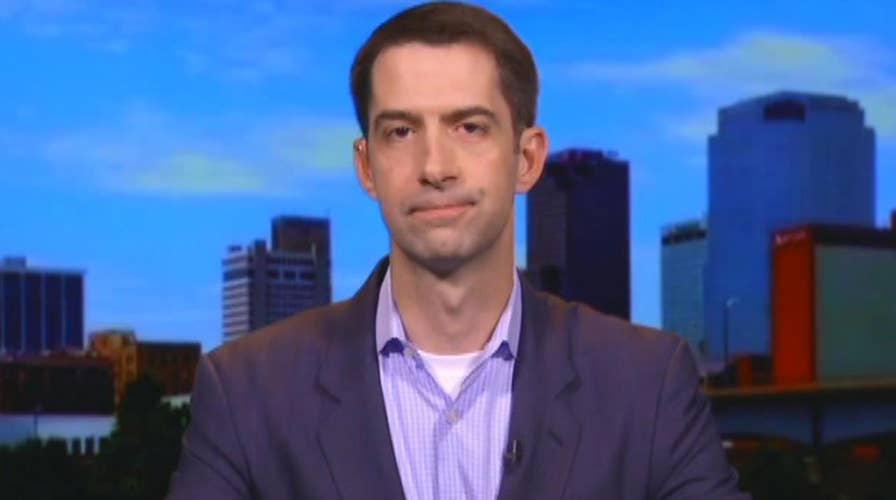Sen. Cotton compares Iran 'ransom' to drug cartel dealings
Sen. Tom Cotton disputes the While the White House's claim that its $400 million payment to Iran wasn't ransom
This is a rush transcript from "On the Record," August 3, 2016. This copy may not be in its final form and may be updated.
GRETA VAN SUSTEREN, FOX NEWS HOST: Was it ransom? The United States shipping $400 million in non-U.S. currency to Iran in an unmarked cargo plane to Iran. Now that giant pay day happening the same day Iran released four American hostages, but not former FBI Bob Levinson.
And, tonight, the White House insisting that giant January cash transfer, it wasn't ransom for the four, it was just a coincidence. Well, that's weird since that's not what Iran is saying.
And now a new report just out that the Justice Department objected to the Iran deal.
Senator Tom Cotton a fierce opponent of the Iran nuclear deal is demanding answers about that payment.
Just a few minutes ago, the Arkansas U.S. senator went ON THE RECORD.
(BEGIN VIDEOTAPE)
VAN SUSTEREN: Senator, nice to see you, sir.
SEN. TOM COTTON, R-ARKANSAS: Good to be on with you.
VAN SUSTEREN: Senator, the payment of $400 million, the Obama administration says that was not a paid ransom for the Americans.
Do you believe that?
COTTON: No, Greta, not at all. I said it was a ransom at the time. I find it highly suspect that a 36-year-old claim was miraculously solved on the same day that Iran release hostages that they had held for many years. This was clearly a ransom payment to release those hostages. And the wages of it is that we now have more American hostages in Iran.
VAN SUSTEREN: Why do you think the president did this, coincidental with the time of the release of the -- I mean, the time of the nuclear deal?
Why -- I mean, if it weren't ransom, wouldn't he have come up with a better way to do this?
COTTON: What also happened at the same time this cold hard cash was flown in to Iran in an unmarked aircraft and these hostages were released was the final implementation of the nuclear deal with Iran. And obviously, I and many others had been sharply critical of the president for not negotiating the release of all these hostages before he even sat down at the table to talk about the nuclear deal.
So I suspect that he wanted to have these hostages gone even though the price of it was $400 million and small unmarked bills flying into Iran on a unmarked aircraft like it was a drug cartel transaction. Not a legitimate negotiation between two governments.
VAN SUSTEREN: Now, just so we get this straight. This was -- this is money that the United States had had from before the revolution in 1979, right? This was part of a settlement with Iran about the funds?
COTTON: Well, it was disputed money related to a transaction with a shah of Iran before Ayatollahs took over in 1979. It hadn't been disputed for 36 years.
And then just miraculously on the day that hostages were released and the Iran nuclear deal was implemented, they finally resolved that dispute. And they have given Iran more money than they were entitled to under their claims and regular rules of interest accrual.
And we now know that they didn't just give them that money, they gave it to them in cold hard cash. Cash that we cannot trace, that we cannot know what happened to. And that even the White House press secretary admitted may be going into the hands of Hamas, Hezbollah or other terrorist organizations.
VAN SUSTEREN: Well, if paying ransom is against American policy, but what can you do about it?
COTTON: We can be a lot tougher on the front end, Greta. We should have said very clearly that we wouldn't even talk to Iran about its nuclear program until all Americans held in captivity were released.
Remember, four years ago, when these talks first started, Iran's economy was suffering badly because of sanctions that Congress had imposed on Iran against the wishes of Barack Obama and Hillary Clinton at the time I should add.
The sanctions were tough enough that we could have set the terms of the negotiations, which included releasing all American hostages before we even sat down.
Now what do we have? A bad nuclear deal and more Americans being held hostage and Iran with $400 million in cold hard cash.
VAN SUSTEREN: We're going to have one of the children of former FBI agent Bob Levinson on in a minute. He's been held since 2007 in Iran. At least we think he's held in Iran.
Any thoughts about that tonight? Because he didn't come home in the prisoner swap in January.
COTTON: Well, my heart breaks for the Levinson Family. And as I've long said, we should have negotiated for the release of all the hostages to include Mr. Levinson who is the longest-held hostage in Iran.
When those hostages were released in January, I rejoiced for them and their families, but the Levinson Family still wonders what happens to Mr. Levinson and you have other Americans who now are being held hostage as well.
This is just one more chapter in the very sad, long history of Barack Obama's speckles dealings with the ayatollahs in Iran.
VAN SUSTEREN: Senator, thank you for joining us, sir.
COTTON: Thank you, Greta.

